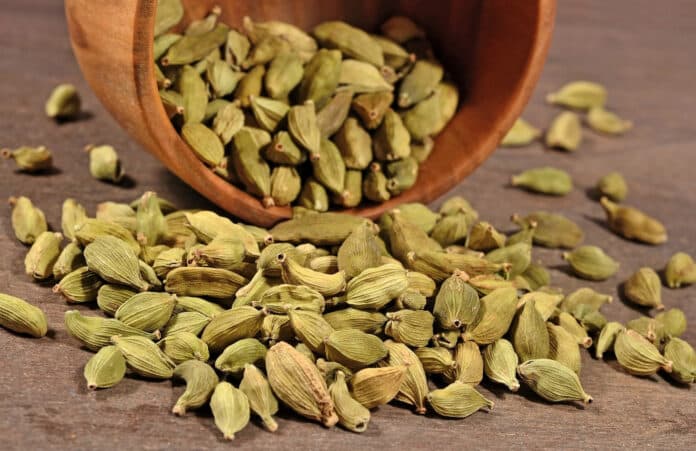Cardamom (Elettaria cardamomum), a popular spice known for its aromatic flavor, has been investigated for its potential health benefits beyond its culinary use. The study explores the effects of cardamom consumption on appetite enhancement and fat burning.
A new study from University of Texas A&M AgriLife found that consumption of Cardamom has many health benefits. These include increasing appetite, losing fat, and reducing inflammation. It makes Cardamom a “superfood.” Dr. Luis Cisneros-Zevallos, a horticulture and food science professor at Texas A&M, led the study. The research showed that Cardamom could be a good choice for a healthy diet. It can help people stay at a healthy weight and reduce fat.
Dr. Amit Dhingra, in charge of the Department of Horticultural Sciences, said, “Professor Cisneros-Zevallos’s research is helping us understand how different crops can affect our health. This matches the department’s goals to focus on sustainability, wellness, and ensuring we have enough food for everyone.”
The study “Cardamom Seeds Boost Energy Use and Reduce Fat in Mice by Altering Brain Signals for Fat Breakdown and Energy Consumption” was published in the International Journal of Molecular Sciences. Cardamom is a spice people enjoy worldwide, and this research could make it even more popular. The spice has a warm herbal taste and a fragrance combining eucalyptus, mint, and pepper.
Cisneros-Zevallos stated, “Cardamom might not be well-known in the U.S., but it’s widely used in other parts of the world. Our findings reveal that this small spice can aid calorie burning, maintain body weight, increase appetite, and influence how much we eat.”
Researchers used live animals and added varying amounts of cardamom seeds to their regular food. They found that Cardamom makes animals hungrier but also helps them burn more energy and lose fat. Cisneros-Zevallos explained this. The research also gave an idea of how much Cardamom people might need – at least 77 milligrams of the good parts of Cardamom for an adult who weighs around 132 pounds. They said, “you could get this by eating about 8 to 10 cardamom pods daily.”
The research showed that Cardamom changes parts of our brain that control how fat is used in our body and how energy is made in our liver and muscles. Cisneros-Zevallos also mentioned that other studies have shown that Cardamom can help reduce inflammation. His analysis suggests that Cardamom might help stop the inflammation leading to many diseases.
He said, “We found that cardamom seeds can be used to make things healthier. They could be used in sports, healthy foods, and supplements to make better and healthier things. “The study also worked with the National Institute of Medical Sciences and Nutrition Salvador Zubiran in Mexico City. The team included Dr. Claudia Delgadillo-Puga and Dr. Ivan Torre-Villalvazo from that institute.
The research unveiled that consuming Cardamom can aid appetite control and weight loss. Dr. Cisneros-Zevallos envisions this breakthrough benefiting sports nutrition and helping those recuperating from illnesses requiring increased food intake.
Cisneros-Zevallos remarked, “Cardamom’s natural components hold substantial potential for crafting health-oriented products.” This revelation proves advantageous for health-conscious individuals and Guatemalan farmers, where over 350,000 families employ sustainable techniques to cultivate Cardamom in tropical forests. He emphasized, “Cardamom plays a pivotal role in Guatemala’s economy.”
If its popularity grows in the U.S. and other nations, it could support farmers and address immigration challenges. The study received backing from entities such as Heifer International in Guatemala, the Inter-American Institute for Cooperation on Agriculture in Costa Rica, the U.S. Department of Agriculture, the Ministry of Agriculture of Guatemala, and the Institute for Advancing Health through Agriculture at Texas A&M AgriLife.
Journal Reference:
- Delgadillo-Puga, C.; Torre-Villalvazo et al, Cardamom (Elettaria cardamomum (L.) Maton) Seeds Intake Increases Energy Expenditure and Reduces Fat Mass in Mice by Modulating Neural Circuits That Regulate Adipose Tissue Lipolysis and Mitochondrial Oxidative Metabolism in Liver and Skeletal Muscle. International Journal of Molecular Sciences. DOI: 1422-0067/24/4/3909.
